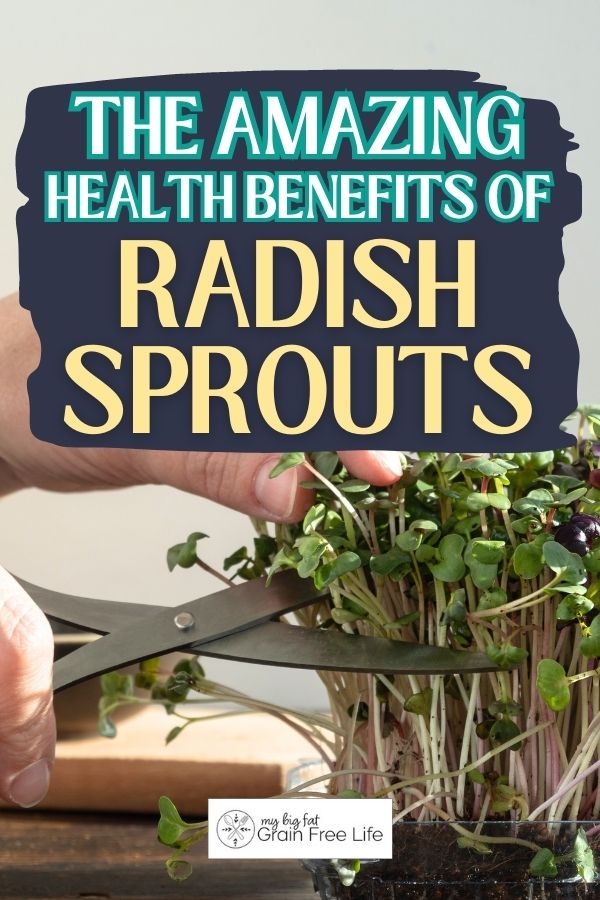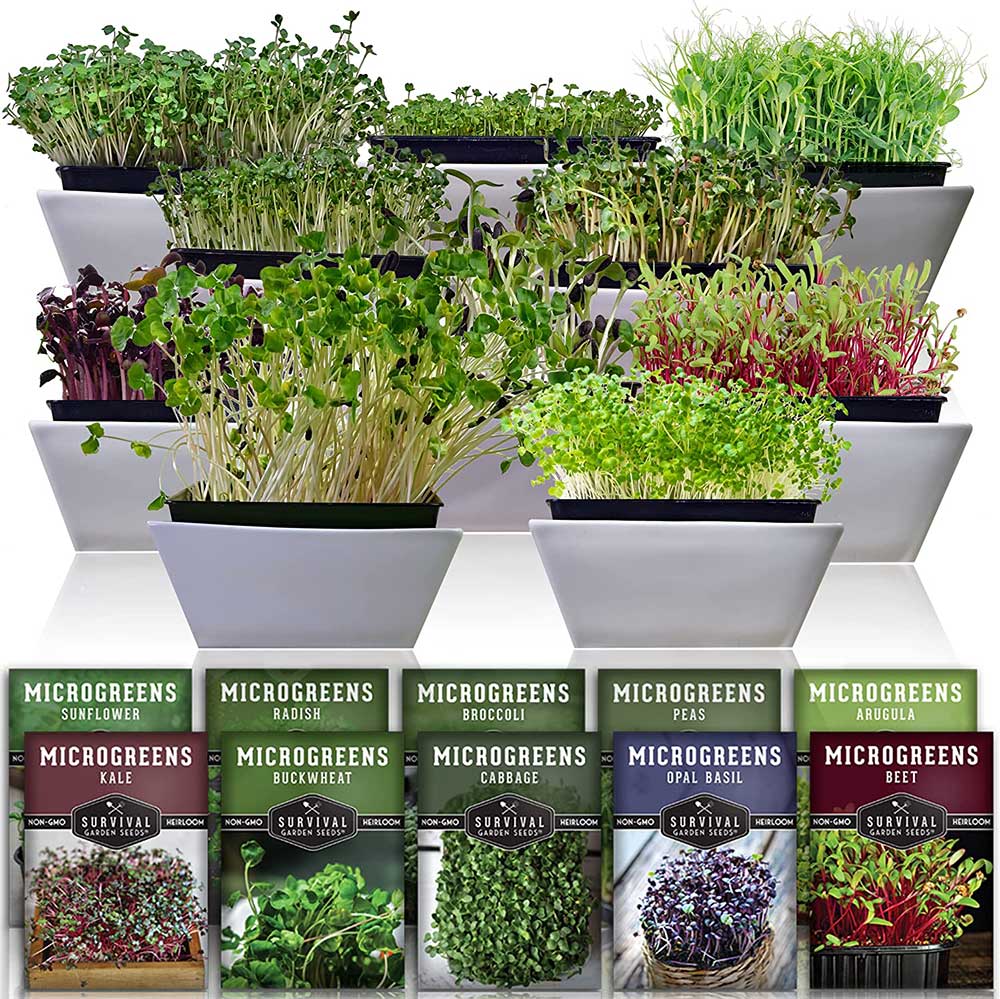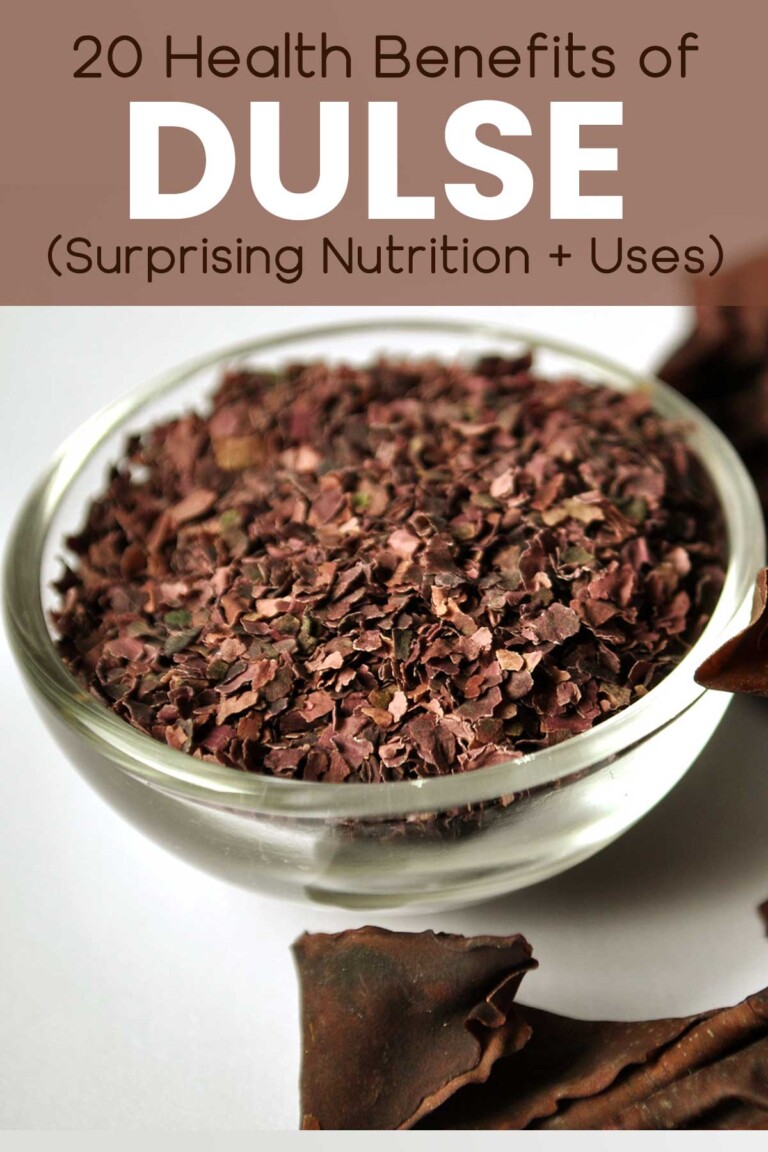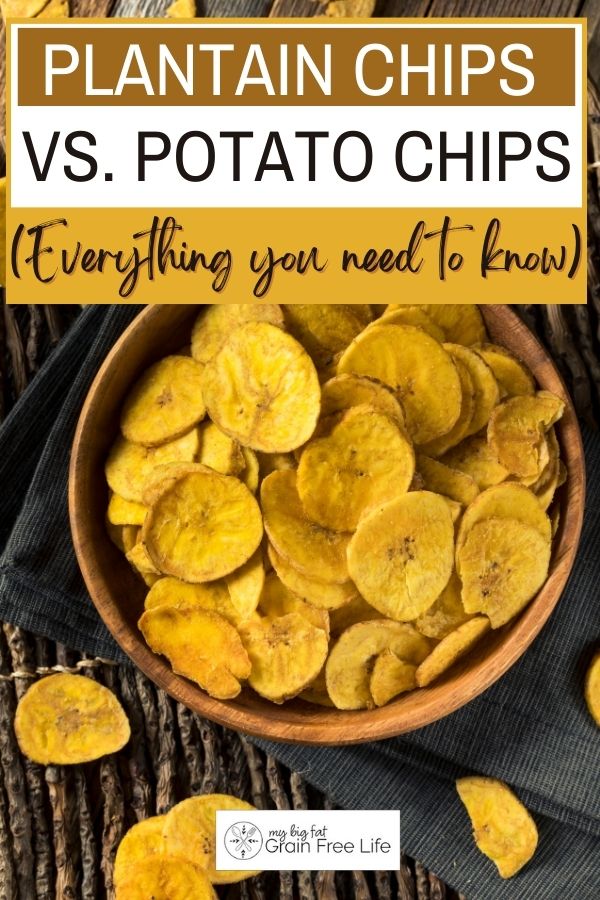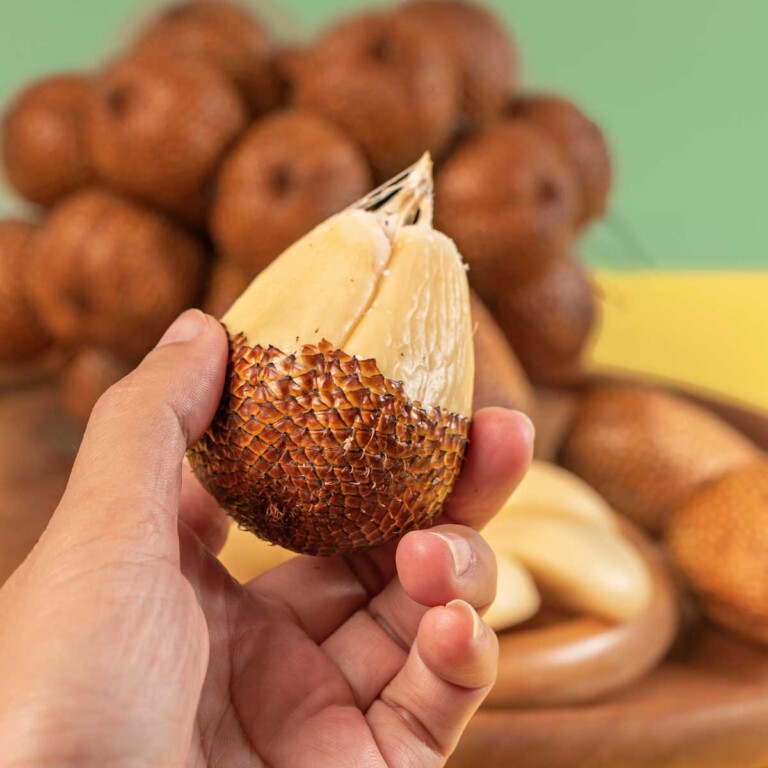The Amazing Health Benefits of Eating Radish Sprouts
This post may contain affiliate links. If you make purchase after clicking a link, I may receive a commission at no extra cost to you.
Last Updated on May 30, 2023
Microgreens have become a popular health food in the last few years, and there’s a good reason for that! Microgreens add texture to your food and nutrients to your diet. Learn about the health benefits of radish sprouts and why you should consider either picking them up at the grocery store or growing them yourself.
Health Benefits of Radish Microgreens
Have you considered adding radish microgreens to your diet? Radishes are a popular tuber, which is a type of root vegetable in the list of cruciferous vegetables. Additionally, radishes are a low-starch root vegetable (other root veggies, not-so-much).
Baby radish plants are an excellent source of vitamins and have high amounts of antioxidants. In addition, they’re easy and fast to grow.
Not all sprouts are considered paleo or are allowed on the autoimmune protocol.
If the vegetable the sprout comes from is allowed on such diets, you can eat the sprouts, but If the sprout source is a non-compliant food such as a legume or a grain, they should be avoided.
What are Microgreens?
Microgreens are green leafy vegetables and herbs grown from seed and harvested at an early stage of growth, the seedling stage. They have increased nutrient levels meaning they’re more nutritionally dense than older plants.
Microgreens are harvested after 7-14 days of growth, while baby greens are slightly older and harvested after 14-40 days. Radish sprouts are harvested after 5-7 days.
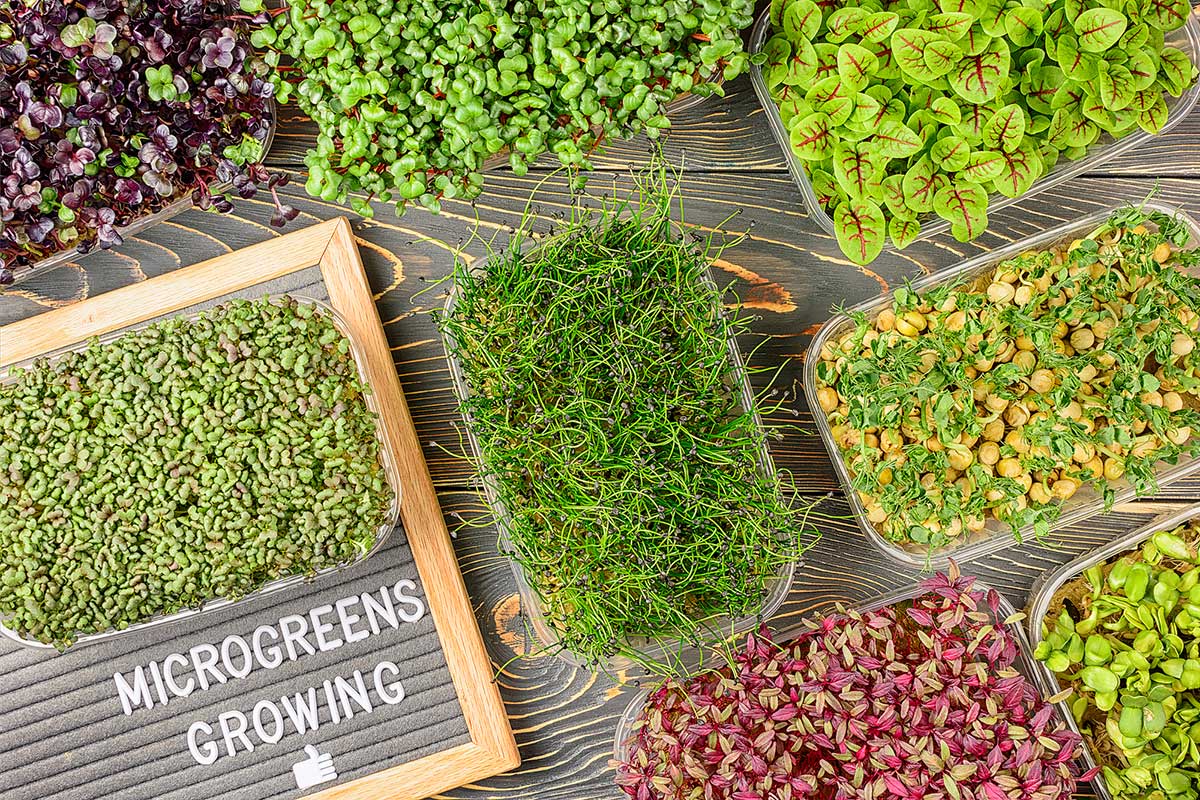
Radish Microgreens
Baby radish plants harvested early in the growing cycle rather than waiting until the plant has reached full growth are called radish microgreens. It only takes ten days from planting the radish seeds until you’re able to harvest them. The microgreens have a mild, peppery taste similar to the bulb of the adult radish rather than the green leaves.
There are many different varieties of radish sprouts from the daikon radish, minowase radish, and red radish sprouts.
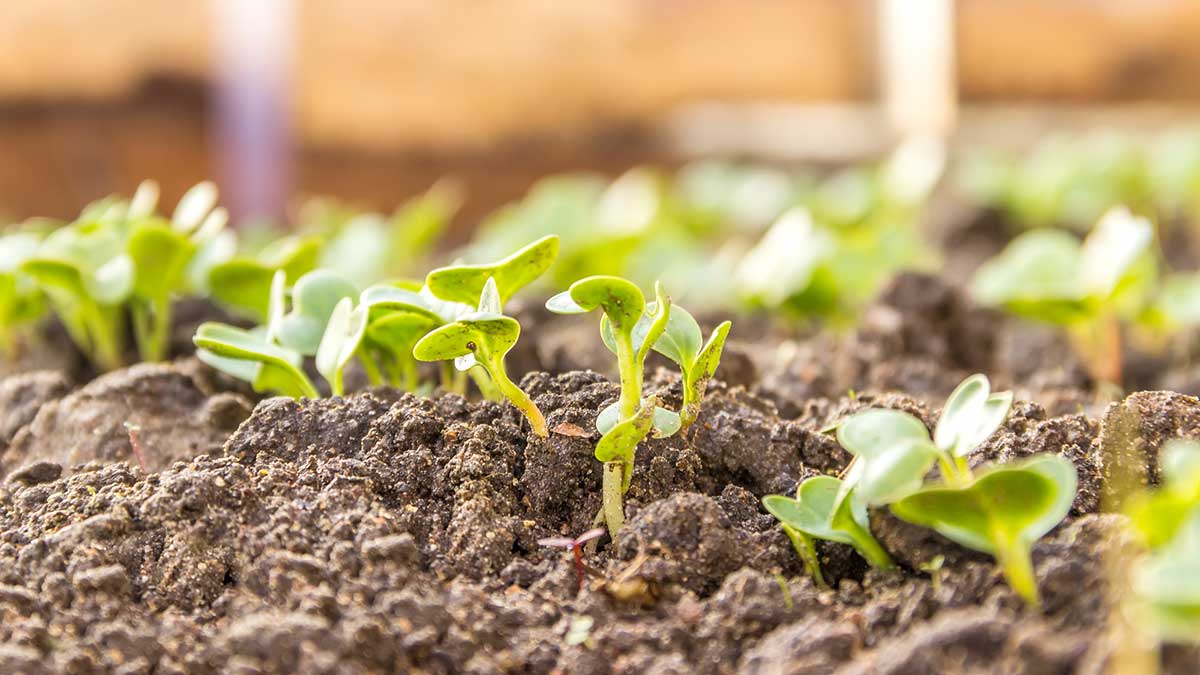
Radish Microgreens Have a Higher Nutrition Content Than Other Microgreens
The Journal of Agriculture and Food Chemistry tested 25 microgreen varieties to analyze their nutritional content. Out of the 25 varieties tested, radish sprouts ranked among the highest microgreens in vitamins.
Radish Sprouts Quick Facts
The radish plant is a root vegetable and part of the mustard family. The sprouts grow quickly, as it’s less than 10 days from planting until you’re able to harvest.
The young sprouts have a mild peppery flavor and can be grown in a mason jar. They’re also full of beneficial nutrients- such as vitamins A, B, C, E, and K.
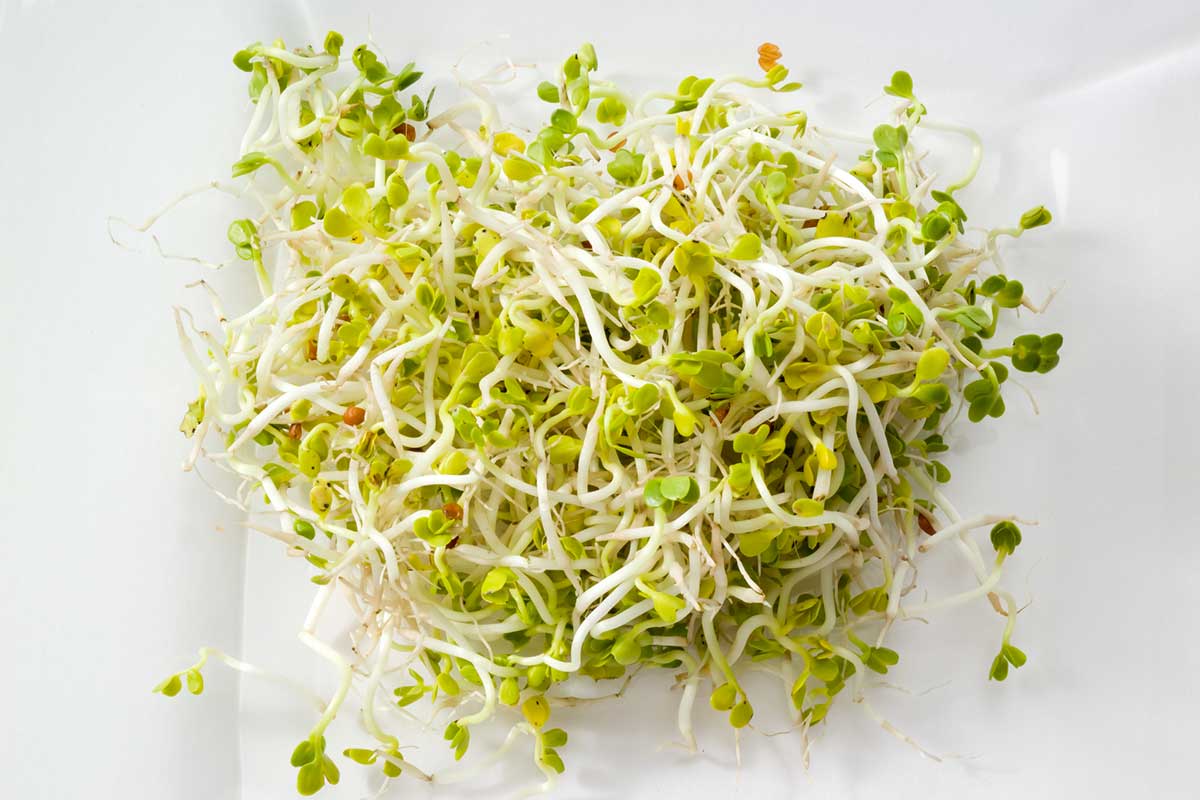
Health Benefits of Radish Sprouts
Radish sprouts not only have a high nutritional value but also offer many health benefits. For instance, eating radish sprouts may improve your cardiovascular health and digestive health, plus they may also have anti-cancer potential.
May Promote a Healthy Heart
Did you know that 100 grams of radish sprouts have a quarter of the daily recommended value of folate? That’s about half a cup of radish sprouts. They also have a high amount of vitamin B6. These nutrients have positive effects on your cardiovascular health and prevent cardiovascular disease since folate and vitamin B6 have both been shown to break down homocysteine in your body.
Homocysteine is an amino acid that causes fatty deposits, or atherosclerosis, in your blood cells which may lead to heart attacks and brain hemorrhages.
May Prevent Cancer
There are also indications that young radish greens may prevent cancer. Radish sprouts are a source of isothiocyanate. Isothiocyanate has been associated with tumor prevention and may cleanse the body of cancer-causing compounds.
Encourage Weight Loss
If you’re looking to lose weight, eating radish sprouts may be a good idea. The sprouts are low in calories and full of essential vitamins like vitamin C.
Did you know that people who were low on vitamin C burned 25% less fat during a 60-minute walking session on a treadmill than people who had enough vitamin C in their body in a study on marginal vitamin C status?
The body makes a compound from vitamin C called carnitine that encourages the body to convert fat into fuel rather than storing is as body fat.
The sprouts are also full of fiber and give you a sense of fullness, encouraging you to eat less.
May Provide Energy
The young radish greens are full of vitamin B complex. This group of B vitamins has a direct impact on your energy levels.
Great for Detox
When you’re working to detox your body, munch on some radish microgreens. The compounds found in radishes and their sprouts help your body cleanse itself from toxins.
Radish Sprouts Contain Antioxidants That Fight Free Radicals
Radish sprouts are also full of antioxidants like vitamin C. Antioxidants stabilize the volatile molecules floating around your body and prevent them from damaging your cells.
May Improve Liver and Gallbladder Function
There are indications that radish sprouts will protect your liver from damage by suppressing inflammation. Research also indicates that sprouts may prevent the body from forming cholesterol gallstones since they have antioxidant and anticholesterol properties.
May Improve Fibrocystic Disease
Eating radish sprouts on a daily basis may help with symptoms related to fibrocystic disease because they have a natural plant estrogen that’s very similar to human estrogen.
May Help Improve PMS and Menopause
The natural plant estrogen in radish microgreens is similar to human estrogen. This means that radish microgreens may relieve symptoms of PMS and menopause.
Just as a heads up, radish microgreens have high folate levels. They’re a great way for pregnant women to ingest more folate, as folate may also help prevent babies from developing severe neural tube defects.
May Promote Healthy Skin
Radish sprouts are also a good way to improve your skin. The high nutritional content of radish sprouts includes high concentrations of vitamin A and vitamin C. Vitamin A is a vital nutrient that helps prevent premature aging by promoting the growth of healthy hair and skin.
Vitamin C destroys the harmful molecules from cigarette smoke, drugs, UV radiation, etc. Plus, vitamin C helps to make collagen which is a protein that plays a vital role in keeping the skin smooth and wrinkle-free.
May Help Improve Digestion
If you suffer from indigestion, then the good news is that radish sprouts may help improve your digestion. They’re a great source of dietary fiber and help maintain healthy bowel movements. Plus, it may improve your bile flow that’s needed to break down fats and improve digestion.
May Help Alzheimer’s Disease
Eating radish sprouts is the easiest way to ingest foods that contain high concentrations of antioxidant components like polyphenols. There are indications that these components will help Alzheimer’s disease.
In addition, the sprouts are full of vitamin E, another antioxidant that shields cells and lipids from damage.
May Help People with Diabetes
As radish microgreens are full of antioxidants, they may help regulate blood sugar levels. They allow sugar to enter the cells like it should and increases the glucose
May Boost Immune System
Vitamin C is one of the essential nutrients that help you to heal wounds and maintain strong blood vessel walls. The vitamin C in radishes may help to protect and boost your immune system. You’ll also find phytochemicals in radish sprouts that may help protect you from disease.
Why You Should Eat Radish Sprouts
Radish sprouts have a delicious flavor that goes well in a stir fry or as part of caluiflower-rice bowls. Plus, they are full of essential nutrients and may offer many health benefits like lower blood pressure.
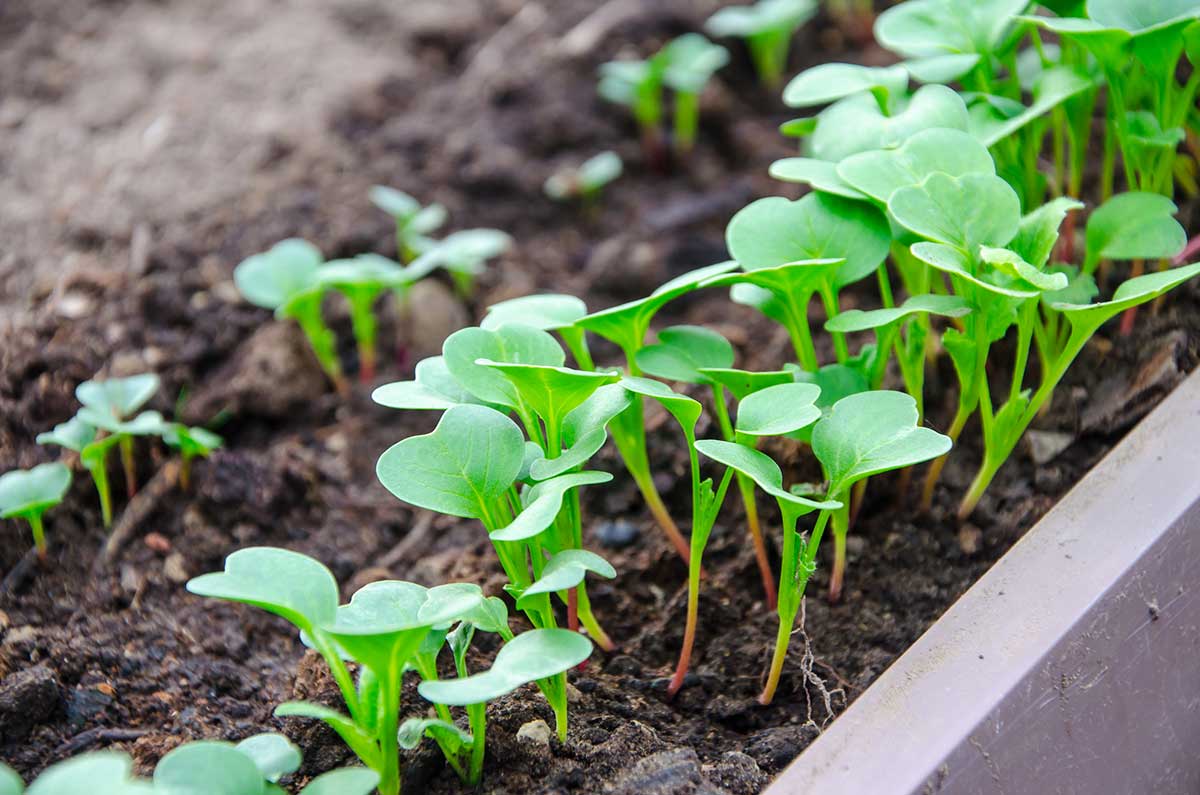
How to Grow Radish Sprouts
In order to grow your own radish sprouts, you’ll need two or three tablespoons of radish seeds, a quart canning jar with a wide mouth, a sprouting lid, filtered water, and a bowl. There are many varieties of radish seeds, so choose a variety that you would like to try like china rose sprouts.
Start the sprouting process by adding the radish seeds to the canning jar and filling it half full of filtered water. Put the sprouting lid on the jar and store it in the open air away from direct sunlight.
The next day you will need to start a rinsing and draining routine. First, drain all the water before adding clean water to the jar. Immediately drain a second time. This is the first rinse. Rince the seeds one more time before angling the jar lid down into a bowl, allowing any water left in the jar to drain into the bowl.
You will need to rinse and drain the seeds twice a day to prevent any mold or bacteria from developing.
After five or six days, you can harvest the seeds. Each time you do a rinsing routine, you can taste the sprouts to determine when the sprouts have the best flavor.
Once harvested, store the sprouts in the refrigerator for up to seven days.
How do Radish Sprouts Taste?
Radish sprouts have a similar flavor to the bulb of the mature radish. It’s a mild peppery taste that goes well in a wide variety of foods.
Where to Get Radish Sprouts?
You may find radish sprouts at your local grocery store. Or you can easily grow the sprouts at home. If you’re concerned about the risk of E. coli or other pathogens from growing the sprouts, you can grow microgreens instead.
How to Use Radish Sprouts
There are many ways to use radish sprouts, from sprinkling the sprouts on your pizza, adding them to a stir fry, or tossing a few into a salad with a homeade vinaigrette. You can also add the radish microgreens to a rice bowl.
Final Thoughts
Radish sprouts are a great addition to your diet. They’re full of essential nutrients like vitamin B, vitamin E, and essential amino acids. In addition, the young sprouts may improve your digestive health, prevent premature aging, and have anti-cancer potential.
They’re easy to grow and provide a delicious flavor when added to salads and rice bowls.
You might also want to check out: Complete Guide on Greens: Collards, Mustards & Turnip Greens
- https://www.healthbenefitstimes.com/radish-sprouts/
- https://www.healwithfood.org/health-benefits/radish-sprouts-nutrition-facts-benefits.php
- https://www.micropharms.com/research/2020/2/14/4gk62pmq8suapzl6zjxkyfx0xsk6uj
- https://www.organicfacts.net/radish-seeds.html
- https://rusticwise.com/radish-microgreens-nutrition/
- https://sweetfernorganics.com/why-you-should-eat-radish-microgreens/
- https://www.homelyveg.com/home/p/beetroot-microgreens-40g-8mlbb
- https://greenchoice.com.sg/shop/microgreen/radish/
- https://energeticgreens.com/raw/portfolio-item/lunch-time/
- https://curejoy.com/content/health-benefits-of-radish/
- https://nutritionandmetabolism.biomedcentral.com/articles/10.1186/1743-7075-3-35

